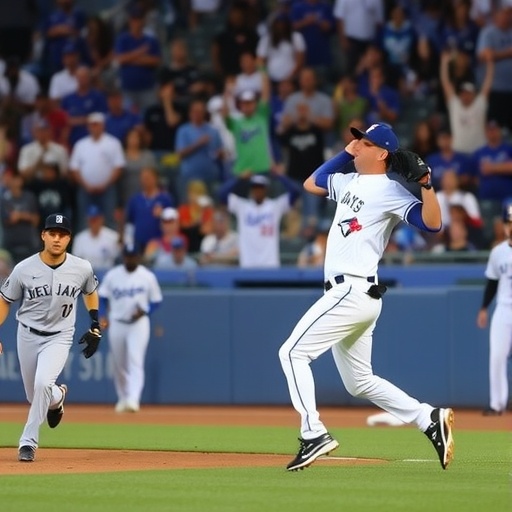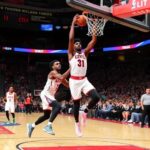Toronto Blue Jays Carry 1-0 World Series Lead into High-Stakes Game 2 Against Los Angeles Dodgers
In a stunning display of offensive firepower and pitching precision, the Toronto Blue Jays routed the Los Angeles Dodgers 9-3 in Game 1 of the World Series, seizing a commanding 1-0 lead that has the baseball world buzzing. As the series shifts to Dodger Stadium for Game 2 on Wednesday night, the Blue Jays aim to extend their dominance, while the Dodgers scramble to salvage their season amid glaring relief pitching woes.
- Game 1 Breakdown: Blue Jays Exploit Dodgers’ Bullpen Meltdown
- Spotlight on Starters: Gausman vs. Yamamoto Sets Game 2 Stage
- Blue Jays’ Playoff Surge: From Wild Card to World Series Contenders
- Dodgers’ Desperate Push: Fixing Relief Woes Before It’s Too Late
- World Series Implications: A Series That Could Redefine Legacies
Game 1 Breakdown: Blue Jays Exploit Dodgers’ Bullpen Meltdown
The Toronto Blue Jays wasted no time asserting their authority in the Fall Classic, turning a tight contest into a blowout thanks to the Dodgers’ beleaguered bullpen. Starter Kevin Gausman delivered a masterful performance for Toronto, going seven innings and allowing just two runs on five hits while striking out eight. His curveball-heavy arsenal kept the Dodgers’ potent lineup—featuring stars like Mookie Betts and Freddie Freeman—at bay, setting the tone early.
But it was the Blue Jays’ offense that truly shone under the bright lights of Rogers Centre. Vladimir Guerrero Jr. led the charge with a three-run homer in the fourth inning, a 412-foot blast to left-center that silenced the Dodger faithful who had traveled north. Guerrero finished 3-for-4 with four RBIs, his timely hits underscoring Toronto’s depth at the plate. “We’ve been waiting for this moment all season,” Guerrero said post-game, his bat flipped dramatically after the homer. “The World Series is ours to take, and we’re not letting up.”
The Dodgers’ relief corps, already taxed by a grueling regular season and playoff run, imploded spectacularly. Closer Evan Phillips, who had a 2.05 ERA during the regular season, surrendered four runs in just two-thirds of an inning, including a bases-loaded walk and a wild pitch that scored a run. Manager Dave Roberts pulled no punches: “Our bullpen let us down tonight. We can’t have that in the World Series.” Statistically, the Dodgers’ relievers posted a 7.71 ERA in the postseason entering Game 1, a figure that ballooned after this debacle. For the Blue Jays, it was their third straight win in the playoffs where opponents’ bullpens faltered, a trend that pitchers like Gausman attribute to Toronto’s aggressive base-running and plate discipline.
Defensively, the Blue Jays were flawless, turning three double plays and committing zero errors, while the Dodgers stranded 10 runners on base. Attendance at Rogers Centre swelled to 49,282, the largest crowd for a World Series game in Toronto since 1993, with fans chanting “Let’s go Blue Jays!” well into the night. This victory not only gave Toronto the series lead but also evened the historical scales— the Blue Jays now hold a 1-0 edge in their first World Series appearance since that championship run three decades ago.
Spotlight on Starters: Gausman vs. Yamamoto Sets Game 2 Stage
Game 2 pits two aces against each other in a matchup that could define the early trajectory of the World Series: Toronto’s Jose Berrios versus Los Angeles’ Yoshinobu Yamamoto. Berrios, the Blue Jays’ veteran right-hander, enters with a 2.44 ERA in the postseason, fresh off a complete-game shutout against the Yankees in the ALCS. His ability to mix cutters and changeups has baffled hitters all year, and against a Dodgers lineup hitting .268 in October, he’ll need every bit of that command.
“Jose has been our rock,” Blue Jays manager John Schneider told reporters. “He’s got that postseason pedigree— we saw it in 2020 with the Twins. This is his stage.” Berrios, 30, hails from Puerto Rico and brings a calm demeanor to the mound, contrasting the high-pressure environment of Dodger Stadium, where the crowd of over 52,000 will create an electric atmosphere.
On the other side, Yamamoto, the 25-year-old Japanese sensation signed to a 12-year, $325 million deal, makes his World Series debut. His unorthodox delivery and devastating splitter have struck out 28 batters in 22.1 playoff innings, but cracks showed in the NLCS against the Phillies, where he allowed four runs in a critical start. The Blue Jays’ scouting report emphasizes patience against Yamamoto’s off-speed pitches, with hitters like George Springer and Bo Bichette preparing to lay off borderline calls. “Yamamoto’s electric, but we’ve faced guys like him before,” Bichette said. “We’re ready to grind at-bats and make him work.”
Statistically, starters have decided 62% of World Series games since 2010, per MLB data, making this duel pivotal. The Blue Jays’ rotation depth—bolstered by trades for Gausman and Chris Bassitt—has been a season-long strength, posting a 3.12 ERA overall. The Dodgers, meanwhile, rely heavily on their bullpen post-Yamamoto, a vulnerability exposed in Game 1. Weather in Los Angeles is expected to be mild at 68 degrees with light winds, favoring pitchers but potentially aiding Toronto’s power hitters if the ball carries.
Blue Jays’ Playoff Surge: From Wild Card to World Series Contenders
The Toronto Blue Jays’ path to the World Series has been a rollercoaster of resilience and clutch performances, transforming a 89-win regular season into a legitimate title threat. Finishing second in the AL East behind the Orioles, the Blue Jays clinched a wild card spot and dispatched the Twins in the Wild Card Series with two shutouts, showcasing their pitching staff’s versatility.
In the ALDS against the Guardians, Toronto rallied from a 2-1 deficit, with Guerrero’s walk-off single in Game 4 sealing the series. The ALCS against the Yankees was their masterpiece: down 0-2, the Blue Jays won four straight, including a 6-5 thriller in Game 5 where closer Jordan Romano struck out Aaron Judge with the bases loaded. Romano’s 1.98 postseason ERA has been crucial, saving four of Toronto’s six playoff wins.
Offensively, the Blue Jays rank third in MLB with a .782 OPS in the playoffs, driven by a balanced attack. Alejandro Kirk’s .345 batting average and Matt Chapman’s 12 playoff RBIs highlight their depth. Historically, Toronto’s 1992 and 1993 championships remain lore, but this roster—infused with international talent like Guerrero (Dominican Republic) and Berrios—brings a global flavor. Ownership’s $250 million payroll investment paid dividends, with GM Ross Atkins earning praise for mid-season acquisitions like reliever Yimi Garcia, who threw 1.2 scoreless innings in Game 1.
Fan support has been electric; Blue Jays merchandise sales surged 45% during the playoffs, per Fanatics data. As they defend their lead in L.A., the Blue Jays embody underdog spirit, having overcome injuries to key players like third baseman Ernie Clement, who returned from a hamstring strain to start in Game 1.
Dodgers’ Desperate Push: Fixing Relief Woes Before It’s Too Late
For the Los Angeles Dodgers, Game 1’s loss stings like a fresh wound, amplifying concerns over their bullpen that has plagued them since August. The unit, once a strength with talents like Blake Treinen and Brusdar Graterol, has blown 12 saves in the second half, culminating in the Game 1 collapse. Treinen, who entered in the sixth, walked two and hit a batter before exiting, his velocity dipping to 94 mph from a season norm of 97.
“We need to regroup— fast,” Roberts emphasized in his pre-Game 2 presser. “Our starters have to go deeper, and the pen has to find its groove.” The Dodgers’ $300 million payroll, the highest in MLB, was built around offense and starting pitching, but injuries to Walker Buehler and Clayton Kershaw have overburdened the relievers. Kershaw, sidelined with shoulder inflammation, watched from the dugout, his presence a reminder of L.A.’s championship pedigree— they’ve won the World Series twice since 2020.
Offensively, the Dodgers aren’t without firepower. Shohei Ohtani, despite a 1-for-5 night in Game 1, leads the playoffs with five home runs, and Betts’ leadoff prowess (.312 OBP) remains a threat. In Game 2, expect Roberts to tweak the lineup, perhaps inserting Max Muncy at first to counter Berrios’ right-handed breaking balls. The Dodgers’ home-field advantage is real: they’ve won 68% of playoff games at Dodger Stadium since 2017, drawing on a fanbase that includes Hollywood elites and die-hards alike.
Behind the scenes, sports psychologists have been consulted to address the bullpen’s mental lapses, with pitchers like Phillips focusing on breathing techniques. If L.A. can’t stem the tide, this series could slip away quickly— they’ve lost four straight playoff games when trailing after six innings this postseason.
World Series Implications: A Series That Could Redefine Legacies
As the Blue Jays and Dodgers prepare for Game 2, the stakes couldn’t be higher for players, managers, and franchises alike. A Toronto win would give them a 2-0 lead, a deficit from which only 12% of World Series teams have ever recovered, per historical data. For the Blue Jays, extending the lead would position them for a potential parade down Yonge Street, their first title since Joe Carter’s famous walk-off in 1993.
The Dodgers, chasing a repeat of their 2020 triumph amid Ohtani’s megadeal, face immense pressure. A loss could ignite trade rumors swirling around underperforming veterans, with ownership demanding accountability. Broader implications ripple through MLB: a Blue Jays victory would boost Canadian interest in baseball, potentially increasing TV ratings north of the border by 30%, as seen in 2016.
Looking ahead, if Toronto sweeps the first two in L.A., the series returns to Canada for Games 3 and 4, where the Rogers Centre roof could trap Blue Jays momentum. Analysts like ESPN’s Jeff Passan predict a seven-game war, but with the Blue Jays’ momentum and the Dodgers’ urgency, Game 2 becomes the fulcrum. Players on both sides speak of legacy— Guerrero eyes MVP honors, while Roberts aims to join the elite managers with multiple rings. As first pitch approaches at 8:08 p.m. ET, the World Series narrative hangs in the balance, promising drama, heartbreak, and perhaps glory for one storied franchise.
In the words of Blue Jays shortstop Bo Bichette: “This is what we play for. Game 2 is just the beginning.” The baseball world watches, breathless.








